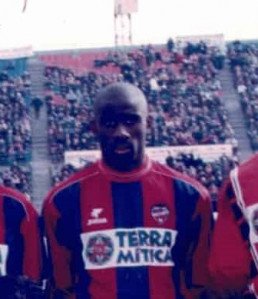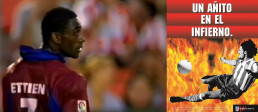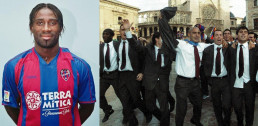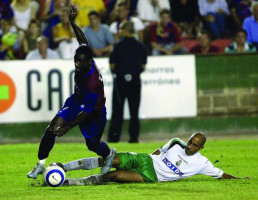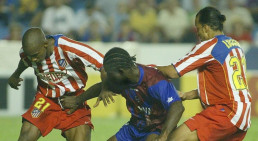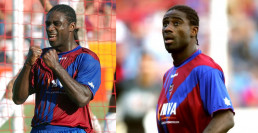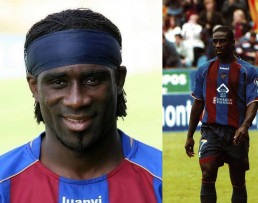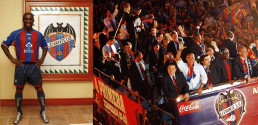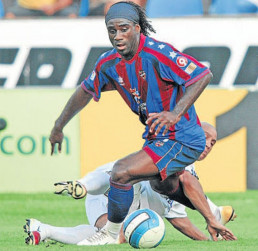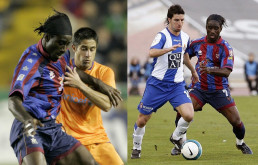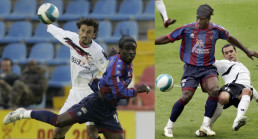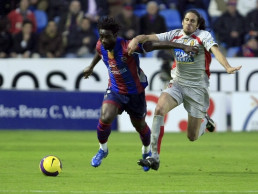In the world of football, there are memorable matches that often mark a footballer’s career. Performances that always come back to the fan’s memory when he remembers those elite sportsmen. Felix Ettien is a perfect example. The extraordinary match he played on 3 September 2000 in Levante UD’s 4-1 win against Jesús Gil’s Atlético de Madrid (that famous president ) made him go down in the history of the club from Orriols. And he didn’t score in that mythical victory, which magnifies his feat even more.
Félix Dja Ettien Yohou was born in Abidjan (Ivory Coast) and his arrival at the Azulgrana team was marked by chance. The Granada technical secretariat was following in the footsteps of the Ivorian footballer Idrissa Keita at the U20 World Cup in 1997. And although this first option was also liked by the Levante scouts, another player from that African team aroused as much or even more interest. His name was Félix Ettien, he played as a striker and what made him stand out above all else was his exceptional physical strength. So both players became part of a Granota squad that at the end of August 1997 began a very uncertain campaign in the second division of Spanish football. That season was a string of inanities, the team failed to get off the ground and, in the end, relegation to the bronze division was the result. Up to five coaches occupied the bench: Emilio Cruz, José Enrique Díaz, Roberto Álvarez, Jesús Aranguren and Pepe Balaguer, who was to continue the following season to captain the desired return to the Second Division. In that debut campaign Ettien only played seven games.
But in the following two games, coach Pepe Balaguer settled into the team and became the main supporter of Félix, who he moved him up the pitch. From attacker, he moved to the right side of the back four, in a five-man defence system used by the coach from La Pobla de Vallbona. The African also became the only Ivorian in the squad, after his compatriot Keita signed for Oviedo following the team’s relegation. Ettien played 26 games in the 98/99 season and played a key role in Levante becoming champions in Group III of the Second Division B, five points ahead of Cartagonova, their nearest challengers. However, that did not grant them direct promotion; to achieve it, they had to win promotion again in a promotion play-off group with Real Madrid B, Polideportivo Almería and Bermeo. And the Granotes were once again the best and achieved mathematical promotion on the penultimate matchday of that decisive mini-tournament. A 2-0 win (with a brace from Fernando Sales) at the Ciudad Deportiva del Real Madrid returned Levante UD to the silver division.
In the 1999/2000 season, the Orriols side performed excellently in the Second Division, finishing a creditable seventh, just five points behind Villarreal, who, as third-placed team, were the last of the teams to be promoted to the First Division. Granota striker Salillas was also the competition’s top scorer with 20 goals. And Ettien, with the full support of Pepe Balaguer, played in all 38 matches of that tournament, scoring two goals (one against Leganés and the other against Elche).
Ettien in 1999/00, his third season as a Granota. The club had been promoted to the silver division from Segunda B. The image is from the 1-1 draw against Las Palmas on 9 January 2000.
The 2000/01 season began with two very significant events. The first was that Balaguer did not continue at the helm, being replaced by José Carlos Granero. The new coach, aware of the physical potential and speed of the Ivorian, decided to free him from his work at the back to give his game a much more attacking focus, turning him into a real wing attacker. And the second was that the draw for the league saw the Levante side open the competition at the Ciutat de València against the all-powerful Atlético de Madrid, who, inexplicably, had been relegated from the Primera División the previous season.
And that match between the Granotes and the Colchoneros was the day Ettien became the new star of Spanish football. Atlético de Madrid, a club that has always been characterised by its excellent promotional campaigns, christened that season’s journey through the desert with the slogan of a year in hell, thinking that they were only going to spend that time in the second division. But they were wrong, because they needed two years to return to the elite. And they would have been promoted if they had only drawn in that league debut at the Ciutat, as they finished fourth, tied with the third placed team, Tenerife, who went up due to their better record against the Red and Whites.
But on that day, Levante played an enormous game and overcame their opponents. The Granotas, against all odds, thrashed Los Atléticos 4-1, in a superb game from the whole team and where Ettien’s performance stood out in a decisive way. He was the author of two goal assists. The first one after a spectacular run down the right flank, dribbling past as many of the Atlético players as he could and giving the ball on a plate to Salillas to score the first goal. And in the second half, after seven minutes, he again assisted (this time to Roa) to score and put Levante back in front after Salva Ballesta had equalised on the stroke of half-time. Subsequent goals from Kaiku and Alberto rounded off a historic night that could be seen all over Spain, as the match was broadcast nationally on Canal Plus. Ettien’s display catapulted him to stardom. Jesús Gil, president of Atlético de Madrid, took his hat off to his performance and shortly afterwards Racing Santander made Levante a firm offer of one billion pesetas to sign him, but the club presided over by Pedro Villarroel turned it down.
Félix Ettien on the day he dazzled the whole of Spain in the match in which Levante beat Atlético de Madrid 4-1. On the right, Kiko Narváez in the poster of that year’s advertising campaign of the red and white club.
After finishing that year in an acceptable eighth place, Levante’s next three seasons in the Second Division saw them go from being on the verge of relegation to Segunda B to returning to the elite 41 years after their last promotion to the First Division. In the 2001/02 campaign, coach Granero was no longer able to optimise the team’s performance and the merry-go-round of changes on the bench returned. Balaguer’s return was also unsuccessful, and after a brief spell at the helm by local coach José Gómez, the coach chosen to save Levante from the drop was Carlos García Cantatero from Madrid. And although he only took one point from Nàstic de Tarragona, the last of the relegated teams, it was enough to avoid returning to the bottom of the bronze category.
But things changed diametrically the following two years. In 2002/03, Cantarero made some great additions, starting with the mediatic signing of Mijatovic and ending with the midfielders Carpintero, Jofre and, above all, Rivera, who added a lot of quality to the team. The unfortunate 2-2 draw against Albacete in stoppage time (after going 0-2 all game) was the key to not being promoted that year. Ettien played regularly, reaching 33 games and scored three goals (his all-time high, which he repeated in other years) against Eibar and Elche (one in Elche and another at the Ciutat).
With the arrival of Manolo Preciado on the bench in 2003/04, the objective was only one: the team had to go up, and for that reason the defence was strengthened with the incorporation of Pinillos and Alexis Suárez and the forward line with David Aganzo and the Argentine Gustavo Reggi. And this time they did. The team was proclaimed champion of the Second Division and after the victory in Xerez by 1-2 (with goals from Reggi and Rivera) the Granotes returned to the First Division after almost forty years without playing with the best.
On the left Ettien with the 2003/04 shirt and on the right in the celebrations in the Plaza de La Virgen de València after the promotion to the First Division achieved in Xerez on 5 June 2004. From left to right Ettien, Aizpurúa, Alexis Suárez, Pinillos, Carpintero and Aganzo.
Levante’s start to the Primera División under German coach Bernd Schuster was spectacular. After a 1-3 win against Numancia on matchday seven, the team was fifth in the table (with the same points as Atlético de Madrid, who were fourth in the Champions League places).
On 12 September 2004, Levante returned to play, almost forty years later, a home match in the First Division. Los Granotes beat Racing Santander 3-1 and Ettien scored the winning goal and, obviously, his first goal in the Spanish top flight. Félix that day
And in the following match at the Ciutat, on matchday four, Levante won again, this time against Atlético de Madrid by 1-0. Félix Ettien could not have had a better reunion with the colchonero team. Above disputing a ball between Colombian defender Perea and French midfielder Luccin.
For the German coach, Ettien was an unquestionable part of his game plan and played in almost every game that season, reaching 34. The Granota side continued like a shot and after the victory on matchday 10 against Athletic, Levante UD were third and in the Champions League places, behind Barça and Real Madrid. The team from Orriols had become, without any doubt, the great revelation of the championship. The fans couldn’t stop rubbing their eyes.
On the left Félix on the day of the 2-0 win over Mallorca. On the right in the 1-0 win against Athletic Club. After that match Levante UD moved up to third in the table.
And then disaster struck, a cataclysm that nobody can explain how it happened. In the last 28 league games, the blaugranas lost 16 matches, drew 9 and won only 3. After the 0-1 defeat against Málaga in the 34th game, Schuster was sacked and José Luis Oltra was brought in. But that desperate measure also failed to turn the situation around and after failing to win in any of those last four matches Levante were relegated to the Second Division. Seeing is believing.
Two images of Ettien from the 2005/06 season, which ended with Lleida’s promotion to the First Division.
There was no choice but to reset and the team was immediately back in the Primera División. After a hesitant start by Oltra, the club decided to replace him on the tenth matchday with coach José Manuel Esnal Mané. With him, things improved substantially and, finally, after a 1-0 win over Lleida on the last matchday (with a goal from Riga, the Granota top scorer that season), the Orriols side returned to the top flight. Ettien was once again trusted by the coaches and played 31 games, scoring on three occasions (against Ciudad de Murcia, Almería and Sporting Gijón). He also achieved two promotions to the first division with Levante, something that very few players can boast of.
Ettien in the VIP box at the Ciutat de València and in the celebrations in the streets of València after Lleida’s promotion to the First Division (in the picture between Descarga and Rubiales).
The 2006/07, his second season in the elite, was, once again, excellent. Ettien played 34 games (under López Caro and Abel Resino) and scored two goals (one against Real Madrid and another, again, against Racing Santander). The team was reinforced by two great players: the Italian Tommasi in midfield and the Ivorian Kapo (Félix’s compatriot) in attack. The Orriols side finished fifteenth.
Ettien dribbling past Real Madrid’s Roberto Carlos at the Ciutat de València. That day he scored the only goal for the Granotes in a heavy defeat against Real Madrid.
Félix in two games in the 2006/07 season against the two teams from Barcelona. On the left in an action with Brazilian Silvinho in the 1-1 draw against Barça at the Ciutat and on the right with Velasco in the draw (also 1-1) against Espanyol at the Estadi Olímpic de Barcelona.
Two more images of Ettien from that 2006/07 season in Primera División. On the left in an action with Sevilla defender Antonio Puerta and on the right with the then Zaragocista (but always a Levante fan at heart) Juanfran.
Ettien and Eto’o in two matches. On the left in the 1-1 draw at the Ciutat de València in the 2004/05 season and on the right with the Cameroonian in the 1-0 win for FC Barcelona in 2006/07.
Ettien in two derbies against Valencia CF. On the left with Vicentín in the goalless draw in 2004/05 at the Ciutat and on the right with David Villa at Mestalla in 2006/07.
The 2007/08 season was Félix Ettien’s last of eleven seasons as a Granota player. And although it was his third season in the First Division, it was a bittersweet farewell. The team finished bottom of the table and were relegated again. And he did not have the confidence he always had from his coaches. After the dismissal of Abel Resino, the Italian De Biasi coached the team for most of the season but was unable to change the dynamic and the last coach of that year, José Ángel Moreno, three quarters of the same. That year, the Ivorian only played 13 games and in the 4-1 defeat in Pamplona he scored the last goal of his career in the First Division.
Félix Ettien in the 2-2 draw between Levante and Mallorca on 20 January 2008 at the Ciutat de València.
But this epilogue cannot tarnish the extraordinary career of this great player, one of the most beloved by the Orriols fans and who, let’s not forget, has two extraordinary statistical data as a Granota footballer. Since the merger of Levante FC and Gimnástico in 1939, he is the second player (after Agustín Dolz) with the most official matches played: 324. And, at the same time, he is the foreign Levante player with the most matches played in the history of the club.
Finally, what is also unquestionable is that if this force of nature that Ettien always was had had a higher technical quality as a footballer, we would be talking, without a doubt, about a top player in the history of national football.
Ettien training at the Ciudad Deportiva del Levante UD in Buñol. On the left with his teammate Miguel Ángel and on the right disputing a ball with the Italian Damiano Tommasi.
